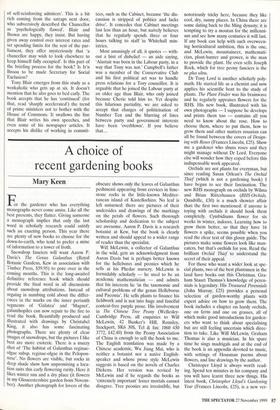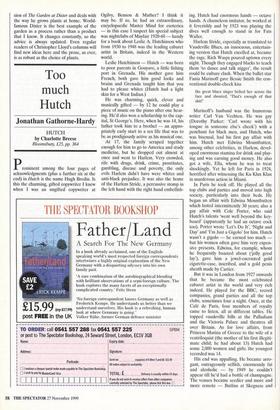A choice of recent gardening books
Mary Keen Er the gardener who has everything monographs never come amiss. Like all the best presents, they flatter. Giving someone a monograph implies that only the last word in scholarly research could satisfy such an exacting person. This year there are plenty of new books to choose for the down-to-earth, who tend to prefer a mine of information to a tower of froth.
Snowdrop fanciers will want Aaron P. Davis's The Genus Galanthus (Royal Botanic Gardens, Kew in association with Timber Press, $39.95) to pore over in the coming months. This is the long-awaited definitive reference book which should provide the final word in all discussions about snowdrop attributions. Instead of arguing in numbing cold about the differ- ences in the marks on the inner perianth segments of 'Galatea' and 'Magnet', galanthopiles can now repair to the fire to read the book. Beautifully produced and illustrated with drawings by Christabel King, it also has some fascinating photographs. There are plenty of clear images of snowdrops, but the pictures I like best are more esoteric. There is a muzzy shot of The habitat of Galanthus reginae- olgae subsp. reginae-olgae in the Pelopon- nese'. No flowers are visible, but rocks in deep shade show how unpromising a loca- tion suits this early flowering rarity. Here it likes winter sun and a dry place (it flowers in my Gloucestershire garden from Novem- ber). Another photograph for lovers of the obscure shows only the leaves of Galanthus peshmenii appearing from crevices in lime- stone rocks in the little-known Mediter- ranean island of Kastellorhizo. No leaf is left unturned: there are pictures of their undersides and drawings of the markings on the petals of flowers. Such thorough scholarship and dedication to the subject are awesome. Aaron P. Davis is a research botanist at Kew, but the book is clearly written and should appeal to a wider range of reader than the specialist.
Will McLewin, a collector of Galanthus in the wild, gets an acknowledgment from Aaron Davis but is perhaps better known for the hellebores and peonies which he sells at his Phedar nursery. McLewin is formidably scholarly — he used to be an academic mathematician — and admits that his interests lie 'in the taxonomic and cultural problems of the genus Helleborus and Paeonia'. He sells plants to finance his fieldwork and is not into huge and fanciful content-free purple prose. His involvement in The Chinese Tree Peony (Wellesley- Cambridge Press, all enquiries to Will McLewin, 42 Bunker's Hill, Romiley, Stockport, SK6 30S, Tel & fax: 1060 430 3772, £42.40) from the Peony Association of China is enough to sell the book to me. The English translation was made by a Chinese academic, Wu Jiang Mai, who is neither a botanist nor a native English- speaker and whose prose style McLewin suggests is based on the novels of Charles Dickens. Her version was revised by McLewin and if he regards the books as 'extremely important' lesser mortals cannot disagree. Tree peonies are irresistible, but
notoriously tricky here, because they like cool, dry, sunny places. In China there are some dating back to the Ming dynasty; it is tempting to try a moutan for the millenni- um and see how many centuries it will last. If any book can help with such overween- ing horticultural ambition, this is the one, and McLewin, mountaineer, mathemati- cian, plant-hunter and grower, is the man to provide the plant. He even sells Joseph Rock, which for tree peony fanciers is the ne plus ultra.
Dr Tony Lord is another scholarly poly- math. He started life as a chemist and now applies his scientific bent to the study of plants. The Plant Finder was his brainwave and he regularly appraises flowers for the RHS. His new book, illustrated with his own photographs — I suppose he develops and prints them too — contains all you need to know about the rose. How to choose them, where to put them, how to grow them and other matters rosarian can all be found between the covers of Design- ing with Roses (Frances Lincoln, £25). Show me a gardener who shuns roses and they might manage without Dr Lord. Everyone else will wonder how they coped before this indispensable work appeared.
Orchids are not plants for everyman, but since reading Susan Orlean's The Orchid Thief (which is not a gardening book) I have begun to see their fascination. The new RHS monograph on orchids by Wilma and Brian Ritterhausen (RHS Orchids, Quadrille, £30) is a much showier affair than the first two mentioned: if anyone is toying with orchids it should hook them completely. Cymbidiums flower for six weeks in winter, indoors. Learning how to grow them better, so that they have 16 flowers a spike, seems possible when you read the clear text of this glossy guide. The pictures make some flowers look like man- eaters, but that's orchids for you. Read the brilliant Orchid Thief to understand the secret of their appeal.
For those who want a wider look at spe- cial plants, two of the best plantsmen in the land have books out this Christmas. Gra- ham Stuart Thomas's knowledge of peren- nials is legendary. His Treasured Perennials (John Murray, £25) provides a personal selection of garden-worthy plants with expert advice on how to grow them. The book includes a chapter on hardy orchids, one on ferns and one on grasses, all of which make good introductions for garden- ers who want to think about specialising but are still feeling uncertain which direc- tion to take. Like Will McLewin, Graham Thomas is also a musician. In his spare time he sings madrigals and at the end of the book is an appendix devoted to music, with settings of Housman poems about flowers, and line drawings by the author.
Christoper Lloyd is always worth read- ing. Spend ten minutes in his company and you will have learnt three new things. His latest book, Christopher Lloyd's Gardening Year (Frances Lincoln, £25), is a new ver- sion of The Garden at Dicier and deals with the way he grows plants at home. World- famous Dixter is the best example of the garden as a process rather than a product that I know. It changes constantly, so the advice is always updated. Even regular readers of Christopher Lloyd's columns will find new ideas here and the prose, as ever, is as robust as the choice of plants.



























































































 Previous page
Previous page